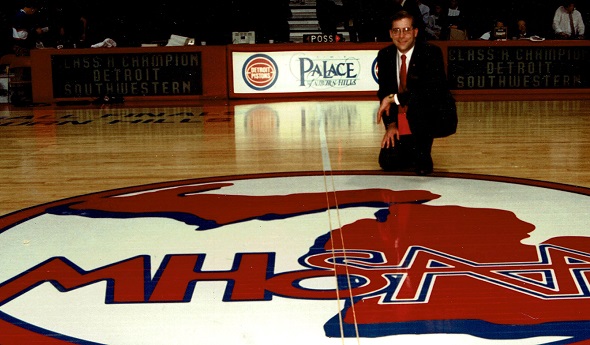
Johnson Served as Storyteller, Guardian
January 5, 2021
By Geoff Kimmerly
Second Half editor
Promoting the value – and values – of school-based sports.
No statement more completely, or succinctly, explains the mission of the Michigan High School Athletic Association.
Those words were sparked in the mind of John Johnson, and also might best describe his work for the MHSAA over more than three decades – which concluded with his retirement Dec. 18.
Johnson’s official title for most of his tenure was communications director, by which he designed and delivered the message of the MHSAA’s work. A more suitable title might have been “guardian” – Johnson in 1987 joined the then 62-year-old organization and became keeper and protector of all the MHSAA had been and was becoming under its recently-hired executive director, Jack Roberts.
More than 33 years later, “JJ” has stepped away as the pioneer in his field and having impacted multiple generations of Michigan high school and middle school athletes in ways that will continue. Whether as the coiner of memorable slogans, the voice explaining the nation’s first elaborate sportsmanship effort or detailing the MHSAA’s work for its schools during tougher times, or simply as the narrator passing on some of the good stories the bubble up from every season, Johnson daily worked to keep those who follow school sports in the know.
 “Being the voice, and having to be the face a lot, is something that came with the territory – somebody had to be the storyteller. And while you can be prideful about that, the important thing is still the story,” Johnson said. “I’ve said it a lot: I was the lucky guy who got the job. Because the story was there to be told, the work was there to be done.”
“Being the voice, and having to be the face a lot, is something that came with the territory – somebody had to be the storyteller. And while you can be prideful about that, the important thing is still the story,” Johnson said. “I’ve said it a lot: I was the lucky guy who got the job. Because the story was there to be told, the work was there to be done.”
Thousands upon thousands of times over the years, Johnson did that work with enthusiasm and grace. Most visibly, it came in front of a TV or radio microphone, or as quoted in your local newspaper and media nationwide. He has been the drive behind the MHSAA championship games watched annually on TV and online, and the messenger via various campaigns delivering the good news of why school sports are vital for kids and communities.
Serving as that storyteller, Johnson has never been one to tell much of his own. But there is no shortage of storytellers who have benefitted from Johnson’s wisdom and tutelage over the years – and we were enable to enlist a few to paint a more vivid picture as we recount at least a glance of what Johnson has meant to the MHSAA and its schools over these many years.
***
“The measure of all of us is what we leave behind. Those with whom we’ve been in contact. Those we’ve lifted up along the way. And by that measure, we are witnessing the end of a spectacular career. I’ll take away from all the exchanges, the ready smile, the encyclopedic knowledge that JJ possessed and the sense of calm within the frenzy. It was invaluable to those who popped into his world only a few times a year. John Johnson has left very large shoes in East Lansing.”
– John Keating, longtime FOX Sports Detroit anchor and host for many MHSAA Football and Basketball Finals
***
First and 1 of a Kind
Jack Roberts became the fourth full-time executive director of the MHSAA during the summer of 1986. He brought an emphasis on communication, and “communications director” became the first position he created in East Lansing.
Johnson in 1987 became that first communications specialist at the MHSAA, beginning a long last stop during a run in sports that Johnson began as a student at Mount Pleasant Sacred Heart, about an hour’s drive north of Lansing.
Johnson hadn’t played sports at Sacred Heart, but had taken part in just about every other way possible for a student. He was a team manager, statistician, student trainer, and picked up part-time sports writing work at the former Mt. Pleasant Daily Times. He wrote a series while still in high school on the creation of the MHSAA football playoffs, which were set to kick off in 1975, and that series was syndicated among the newspapers in the Daily Times’ chain. As a student, Johnson moved on to Michigan State University where he majored in journalism, and again he was published and syndicated by the Daily Times – this time for a series on how game officials were being trained by state associations, including the MHSAA.
That series foreshadowed the work he would take up a decade later – it closed with a piece on poor spectatorship toward officials. (Coincidentally, the collection of stories had been clipped and saved by the MHSAA executive director at the time, Vern Norris. The file found its way to Roberts, who eventually found out he had just hired the author.)
Also having served as a student assistant in the MSU sports information office, Johnson began his communications career at Albion College in 1978 as an assistant in the college relations office with responsibility for publicity for the college’s 17 athletic teams. (He didn’t graduate from MSU until 1979, but received two days off per week to get back to East Lansing for classes. He also served as a radio voice for Albion High games on the side.) Johnson moved on to brief stints in the news department with WITL Radio in Lansing and as an intern in the Office of Public Affairs at Ferris State University before landing with the Western Michigan University sports information department as an assistant director.
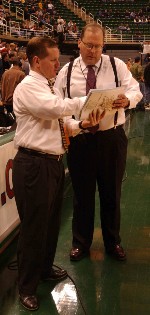
That led to a three-year stint as an assistant sports information director at Indiana University, where his responsibilities included serving as SID for coach Bobby Knight’s men’s basketball program. Johnson also assisted with press operations at the 1984 U.S. Olympic Basketball Trials hosted by IU. Johnson then left Indiana in January 1986 for a promotions position at Michigan Farm Bureau.
Six months later, his eventual journey to the MHSAA accelerated.
Roberts was hired during the summer of 1986, and not long after he asked MSU sports information director Nick Vista who had been his best student assistant of the past decade. The answer: John Johnson.
Johnson and Roberts met multiple times over the next many months, and Roberts made his choice.
“From the first moment I sat down with Jack Roberts, I knew I wanted to be here,” Johnson said. “The way he talked so passionately about high school sports, and the values of high school sports. … I saw the opportunity to take Jack’s vision and run with it.”
The day before the announcement of Johnson’s hire was to be made, Roberts asked Johnson to come with him to Grand Rapids to watch South Christian basketball star Matt Steigenga (later of MSU and the NBA) – but Johnson couldn’t go because his wife Suzie had gone into labor with their first of two children.
But a little more than a month later, Johnson started at the MHSAA on April 1 – and that came with plenty of jokes on its own.
Yet while Johnson had to miss that trip to Grand Rapids, he and the executive director would get plenty of car time together – to the benefit of the MHSAA’s member schools. To introduce themselves to statewide media, Roberts and Johnson did a driving tour to visit all of them, touring their offices, talking to them about MHSAA initiatives and asking how Association staff could better assist the media in its work. Those drives also allowed them to dream up together “the kinds of things that were unveiled over time,” Roberts recalled.
“We talked so much those first 15 years, we could intuit each other’s thinking the last 15 years,” added Roberts, who retired from the MHSAA in 2018. “We didn’t spend nearly as much time together, but we didn’t need to.”
***
“John Johnson has positively influenced so many more people than he knows and more than anyone realizes. It starts with the thousands and thousands of people who have been able to watch high school sports on the web throughout Michigan. Live-streaming of games has really come to the forefront due to the pandemic, but he was on top of this innovation nearly a decade ago when it was just in the early idea stage. He has been the person who orchestrated and led the countless schools across the state who started streaming their games in the past several years.
“JJ has also impacted numerous student journalists who wanted to learn the craft by covering high school games. He has always been SO supportive of these aspiring broadcasters and writers and reporters, affording them the opportunities to cover high school championships on the biggest stages, and treating those students the same as their professional peers. The students got to be on the turf at Ford Field and in the postgame press rooms, even if their school's team wasn't involved in the game! All they had to do was ask for credentials, and he granted them time and time again.
“JJ's influence also touched those of us who work for the MHSAA in a freelance fashion at various championship events. He has helped so many of us become better communicators, announcers, statisticians, and more. He was always willing to provide feedback & opportunities to learn, and he served as our leader who was always accessible morning, noon, and night. He pushed us to be our best every game, just as the athletes were trying to be their best. It's been my pleasure to work for him as a PA announcer for several years now, and I tried to be perfect every single time because I knew he was listening and because I wanted to do well for him.”
– Roger Smith, advisor for Lake Orion High School’s nationally award-winning School Broadcast Program and public address announcer for MHSAA Finals
***
Telling the Story
In Roberts’ eyes, a few campaigns from his and Johnson’s time together stand out most.
• Promoting the Value – and Values of High School Sports. “I came in with “School Sports – the other half of education” but that wasn’t as good,” Roberts said. … (His words) caught our brand much better.”
• Good Sports are Winners. The MHSAA launched a sportsmanship initiative a few years into their tenures that was “unparalleled” nationally, per Roberts’ description. “Before sportsmanship was an 'in thing' to talk about, John and I were talking about it.” Johnson created all of the print and broadcast materials designed to promote improving sportsmanship, and his work helped make Michigan not just the leader but a voice nationally on the topic.
• Safer Than Ever. The campaign, stretching over much of the last decade, explained that high school football – for a variety of reasons – is safer than it has ever been. Johnson worked with the Michigan High School Football Coaches Association to build the messages and promote them at a time when injury fears were regularly headlining media coverage.
 “John made our ideas visible and practical. People would put them together at the league level and school district level,” Roberts said.
“John made our ideas visible and practical. People would put them together at the league level and school district level,” Roberts said.
“To narrow (his work) down to three is unfair to him because he did a thousand things.”
And in a number of roles. Johnson started as communications director, picking up along the way responsibilities in information technology, marketing, merchandising and more. Everything from daily media questions to maintaining the MHSAA record book (and serving on the National Federation of State High School Associations (NFHS) national record book committee) fell onto Johnson’s desk, and just about any message read at any game by a public address announcer was his work. His final years were as “all things broadcasting” as Johnson served as the MHSAA’s first director of broadcast properties – an all-encompassing title that included all-encompassing responsibilities.
The MHSAA provides video broadcasts of nearly all of its MHSAA Finals – including football and basketball with FOX Sports Detroit – and Johnson has navigated the growth of those opportunities. Same with the MHSAA Network’s audio offerings during championship events, and his voice has been heard weekly during “This Week in High School Sports” which is aired as part of programming by more than 100 radio stations statewide.
The most significant advance under his guidance over the last two decades has been the School Broadcast Program, begun for MHSAA schools during the 2008-09 school year. The MHSAA relied on that knowledge in playing a leading role last decade in the formation of the NFHS Network – the nationwide digital home for live and on-demand high school events – and it’s not unusual for Michigan SBP schools to broadcast upwards of 500 events per week via the network.
“What people don’t necessarily know is John is the pioneer in this field,” MHSAA Executive Director Mark Uyl said. “The way he shaped this job over the last 30 years has been extraordinary – and has become the model for the 49 other states.”
***
“I’m sure that with me, JJ had to do things he never had done with anyone else – I was pregnant three straight schools years. The accommodations for me, even as just a female, it was kinda crazy especially in the 1980s. But when I was pregnant, I couldn’t walk up stairs, and he always would make special concessions for me, (like to) try to find bathrooms for me. There were so many media, and there always had to be exceptions, but he always had to take special care for me, and I’m so thankful for what he did. We laugh about that stuff all the time.
“I remember too, I had a tragedy in my family one year, and I know he was busy at the Finals, but he took me (aside), sat there and cried with me and talked with me. He took time out of his way. He treated me professionally, like everyone else. But as a person, he has such a gift to connect with people.”
– Jane Bos, longtime prep sports editor for the Grand Rapids Press and 2008 recipient of MHSAA Women In Sports Leadership Award
***
More than Scratching the Surface
The work Johnson pioneered at the MHSAA goes on. Formerly a staff of one (with help from valuable volunteers including long-time postseason assistant Walter Dell) now includes a team of employees to handle the media relations, publications, broadcasting, marketing and other messaging needs.
While making the rules for school sports remains the top priority for the MHSAA, telling the story of their importance in students’ lives comes in a close second – and Johnson has written at least the first chapters of the book.
“It needed to be done; the Association had to take bigger steps into the communications world. And thanks to Jack Roberts, it did. I was the lucky guy who landed in the chair,” Johnson said.
But again, that is simply scratching the surface. We’ll end with longtime Detroit Free Press sportswriter Mick McCabe taking a last deep dive.
I first met John Johnson in the late fall of 1977.
He was a student at Michigan State and worked in the sports information office. I was a sports writer for the Detroit Free Press, covering MSU basketball, featuring JJ’s brother, Earvin.
Well, maybe Earvin and JJ weren’t exactly blood relatives, but they were both fun to be around and each had a profound effect on my life.
No, really.
When watching the Spartans back then you knew you were watching someone special, which is why they called him Magic.
 No one ever used the word magic in describing JJ, but he was young and enthusiastic and sociable while he learned the tricks of the trade under the watchful eyes of Fred Stabley Sr. and Nick Vista, the absolute best sports information directors in the country.
No one ever used the word magic in describing JJ, but he was young and enthusiastic and sociable while he learned the tricks of the trade under the watchful eyes of Fred Stabley Sr. and Nick Vista, the absolute best sports information directors in the country.
That is why I knew JJ would be such a good fit at Albion College, which just so happened to be looking for an SID when JJ was graduating from MSU.
JJ was exactly what Albion needed and did an excellent job and soon JJ’s career was off and running.
Somewhere along the way JJ landed at Indiana University where Bob Knight learned to tolerate JJ. If you’ve ever met Knight and understand his relationship with other human beings, you know that is like saying JJ and Knight were besties.
That was reinforced in the spring of 1984 when I spent almost two weeks in Bloomington covering the U.S. men’s Olympic basketball trials and interacted with JJ on a daily basis.
In the spring of 1987 JJ accepted a job with the Michigan High School Athletic Association. It was a job that hadn’t existed before JJ came riding into town.
Jack Roberts was in his first year as the MHSAA’s executive director and JJ was one of his first hires. He was also one of his best.
JJ was hired as the MHSAA’s first communications director. Before JJ arrived the words “communication” and “MHSAA” had never been used together in the same sentence.
If a member of the media had a question for the MHSAA chances are good it would never be answered.
That changed the minute JJ was hired. If he didn’t know the answer, he got the answer for you. And if you needed to speak with someone about a particular question, JJ got you to that person.
It wasn’t JJ’s job to do our job for us, but the thing we didn’t want was for him or someone else from the MHSAA to get in the way of us doing our job.
Not only didn’t JJ get out of the way for us, he helped us and made our jobs easier with the way he ran communications for the MHSAA.
A few weeks ago, with JJ’s imminent retirement growing closer, someone asked me to describe the worst phone call I received from JJ, one in which he was irate with something negative I had written about the MHSAA.
Certainly, he assumed, over 34 years there had to be many such phone calls.
He was genuinely surprised to learn it never happened. Not even once.
JJ knew that the media has a job to do and his job didn’t require him to complain when something negative about the MHSAA was written. I’m certain it was a lesson he learned from Stabley and Vista, who operated the same way.
As far as I know, the only times JJ ever called a member of the media after a negative story was when the reporter had the facts wrong. His call just pointed out the errors and he left out the tongue lashing.
JJ was the consummate professional in doing his job and he did it better than anyone else.
There is no way I am going to describe JJ’s job performance at the MHSAA as magical, like Earvin’s, but it was pretty darn close.
PHOTOS: (Top) MHSAA Communications Director John Johnson kneels at midcourt at The Palace of Auburn Hills in 1990 having designed the floor for that year's Basketball Finals. (2) Johnson, middle, wears the headset during a playoff production. (3) Johnson, right, coordinated media, announcing and stat-keeping among other areas during MHSAA events at the Breslin Center. (4) Johnson, far left, stands with (from left) MHSAA public address announcers Roger Smith, Erik O. Furseth, Tony Coggins and Steve Miller during a Baseball/Softball Finals weekend. (5) Johnson walks the turf at Ford Field during a Football Finals. (Photos from MHSAA archives.)
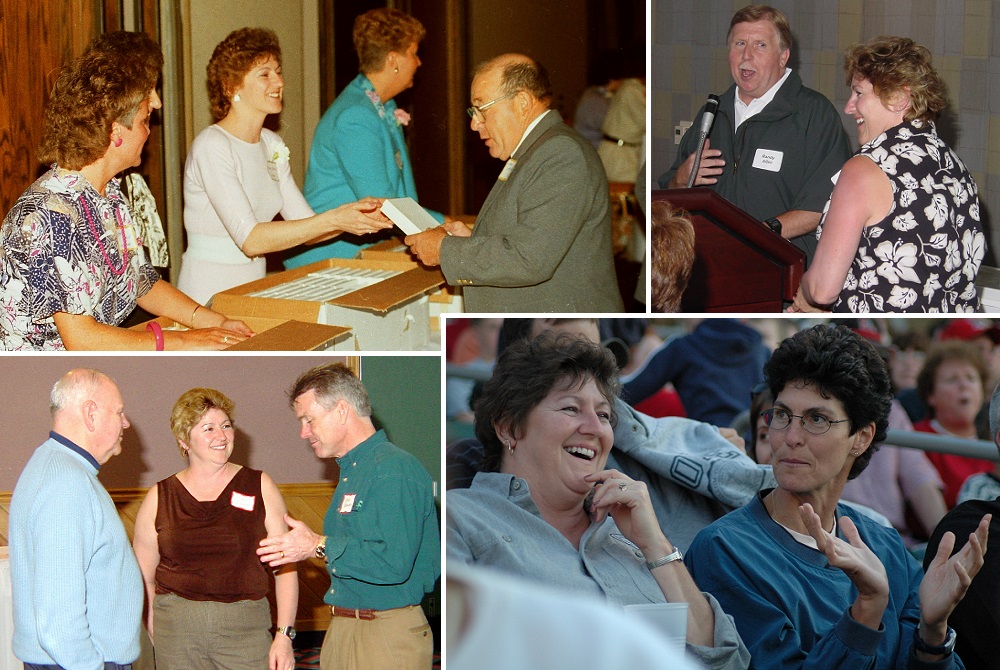
Jackson's Imprint on MHSAA Stretches 45 Years, Across 4 Executive Directors
By
Geoff Kimmerly
MHSAA.com senior editor
October 5, 2022
First impressions can be significant, as many a saying goes. And Karen Brown unknowingly provided one in 1978 that helped affect the course of athletics in this state over the next 40-plus years.
A Michigan State University student named Karen Leinaar had shown up at the Michigan High School Athletic Association for a meeting about a 5K road race she was planning that was unrelated to the MHSAA except that the building provided a good meeting place – and Brown, just a year out of high school, was the first person to greet her at the old Trowbridge Road headquarters.
Seeing someone her age immediately made Leinaar more comfortable. She ended up returning to that office several times over the years, registering as an MHSAA game official while still an MSU student and then starting a career in 1982 that has included nearly 40 years as a high school athletic director and two decades of shaping policy as part of the MHSAA Representative Council.
That’s the kind of impact that’s emanated from Karen Jackson, formerly Brown, and over the last 45 years as assistant to four of the five executive directors during the MHSAA’s 98-year history. Jackson finished that run with her retirement Friday.
“She was always one that would welcome you, and whether you walked into the office or called on the phone, she always had an answer that would calm you down or provide you with the information you needed,” said Leinaar, who currently is serving as interim athletic director at Frankfort High School in addition to her duties as executive director of the Michigan Interscholastic Athletic Administrators Association.
“I remember initially calling and needing something from Mr. Norris – it was always Mr. Norris – and she could answer the question,” Leinaar added, referring to retired MHSAA executive director Vern Norris, who served in that role from 1978-86. “You didn’t want to talk to scary Mr. Norris – Vern was a wonderful man, but he was like the superintendent or principal. Karen always had the answer. … It was always that smile that made you feel like you were more than welcomed, wanted in the office, and everything is going to be OK.”
 Jackson began at the MHSAA in June 1977, two days before her graduation from long ago-closed Harry Hill High School in Lansing.
Jackson began at the MHSAA in June 1977, two days before her graduation from long ago-closed Harry Hill High School in Lansing.
Her high school sports career amounted to about half a season on the Hill varsity volleyball team as a sophomore before she had to switch gears to begin working for the Lansing Regional Chamber of Commerce as part of a school co-op program.
Jackson graduated as a co-valedictorian of Hill’s Class of 1977. Despite her academic standing, she hadn’t received much guidance at school on the possibility of college. But she had a job offer from the Chamber – and also had heard from grade-school friend Deborah Norris (Vern’s daughter) about an opening at the MHSAA.
The MHSAA was offering more money, and Jackson was hoping to buy a car – and so at 18, she became the secretary for executive director Allen W. Bush.
The title has changed over the years, from secretary to the executive director, to executive assistant, to senior executive assistant. The MHSAA’s administrative processes obviously have changed, mostly because of technology, from everything done on paper and through the mail to just about everything conducted digitally over the internet.
But many of Jackson’s most important duties at the end of her tenure resembled those she was hired to carry out nearly half a century ago.
Setting Exemplary Expectations
Bush retired a year after Jackson began, and she then assisted Norris for his eight as executive director. She served with Jack Roberts through his 32 years as executive director from 1986-2018 and then for these first 3½ under current director Mark Uyl.
She was considered the “baby” of the MHSAA staff during her first 12 years, until she turned 30 and her support staff teammates declared she wasn’t the baby anymore during a Christmas party serenade. Just about 33 years later, she’s leaving as one of two people left who worked in the old offices before the MHSAA moved to another East Lansing headquarters at Ramblewood Drive in 1996.
School sports happen thanks to a Karen Jackson or two in every community -- people who provide the unseen support that makes these programs possible every day.
For the last 45 years, she’s provided a consistent anchor for service to 1,500 schools and millions of student-athletes across Michigan.
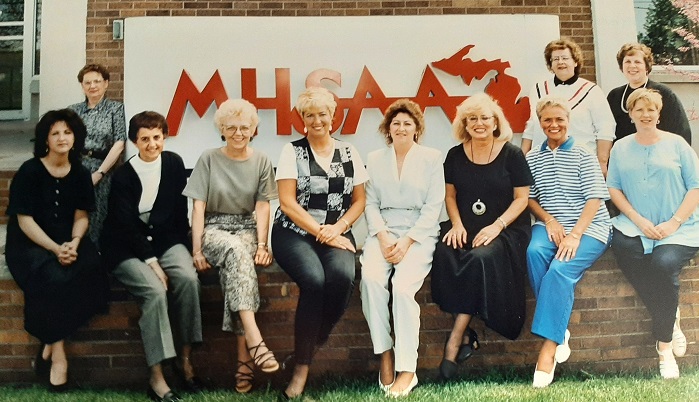 “She’s shaped so much of what we’ve done,” said MHSAA assistant director Kathy Vruggink Westdorp, who joined the staff during the 2003-04 school year after more than two decades working for Grand Rapids-area schools. “Her service to schools was imperative to what she was doing, and it was a valuable part for our membership. Hers was such a dedicated service, such an exemplary service – finding solutions, to do what’s needed.”
“She’s shaped so much of what we’ve done,” said MHSAA assistant director Kathy Vruggink Westdorp, who joined the staff during the 2003-04 school year after more than two decades working for Grand Rapids-area schools. “Her service to schools was imperative to what she was doing, and it was a valuable part for our membership. Hers was such a dedicated service, such an exemplary service – finding solutions, to do what’s needed.”
There are file cabinets and libraries and hard drives at the MHSAA office, the contents of which are known by only a handful of people on Earth – and Jackson perhaps the most as she did most of the sorting and maintaining of those files over the years.
For a 1996 Lansing State Journal feature on the MHSAA’s support staff, Jackson (then Yonkers) explained “there are always new challenges, new issues and controversies. It never gets boring. In the past 19 years, we’ve slowly shifted from dealing with athletic administrators, principals and superintendents to dealing with legislators, attorneys and courts.”
The last 25 years has seen much of the work swing back to providing service directly to schools. And Jackson’s mind has become part MHSAA library and part card catalog of where to find those few snippets she might not recall immediately from the last half century.
“I guess what I’m proud of is being able to find things, to know where to find things and how to find things that other people don’t,” Jackson said. “Yes, the technology has changed everything. … We used to have more schools – they used to have 40-some Detroit public schools – and there was a whole era of (litigation), but it’s calmed down now.
“I liked what I did, and it kept me on my toes – that’s for sure.”
The MHSAA is rooted in its responsibilities as a championship and eligibility rules maker, and Jackson was involved in just about every communication in those areas during her time. Tournament changes are made at Representative Council meetings, and she’s reported the minutes for at least 150 of those, including piles of special sessions as the MHSAA managed sports through the COVID-19 pandemic. Eligibility waivers are requested at Executive Committee meetings, and she’s prepared somewhere north of 505 sets of minutes for those monthly sessions even as those agendas have grown in content substantially over the years.
Then there’s all of the correspondence from those four executive directors – all with the initials “kb” or “kj” to go with “AWB” or “VLN” or “JER” and “MU.” She also was in charge of MHSAA election ballots for 35 years, served as the lead organizer of cooperative programs, helped with football tickets for a time and briefly was part of the program-selling crew at early Football Finals at the Pontiac Silverdome.
“I think I’m pretty lucky, being on the Council and Executive Committee, that I’ve been able to work with her a lot. And most athletic directors, they may not even know who she is because they may not have contact with her or do anything with her – but she’s obviously been the unsung hero of that office,” said Vic Michaels, who serves as director of physical education & athletics for the Archdiocese of Detroit and has served on the Representative Council since 2003.
“She just does so much that you don’t really know about, especially with the Council. Whenever I need anything, Karen’s the one I call. She is the history, really. She’s the keeper of that.”
Unprecedented & 'Never to be Replicated'
A longtime co-worker of Jackson, Shirley Hytinen, retired in 1998 after just a few months more than 43 years. She too had worked for four executive directors, as she began in 1955 during the Charles E. Forsythe era.
Jackson surpassed Hytinen’s tenure a few years into Uyl’s, and can readily recall some of what stood out from all four directors she’s assisted.
Bush was “really stern” – he had served in the U.S. Marines – and she said he didn’t smile much until the day he announced his retirement, when it was “like a switch turned. He was smiling and happy and joking around.”
Norris was “the sweetest guy in the world.” Jackson had bought her first house in her mid-20s and was preparing to move in with only her dad and his motor home to assist, when Norris showed up to help at 7:30 a.m. that morning to provide another set of hands.
Roberts is known by Michigan administrators and national colleagues for his writing, and Jackson said jokingly she still “cringes” when she sees a yellow legal pad. She was an important proofreader and spent the majority of her career serving with her desk just a few paces away from that of the recent National Federation Hall of Fame selection, and she attended his induction this past summer and San Antonio.
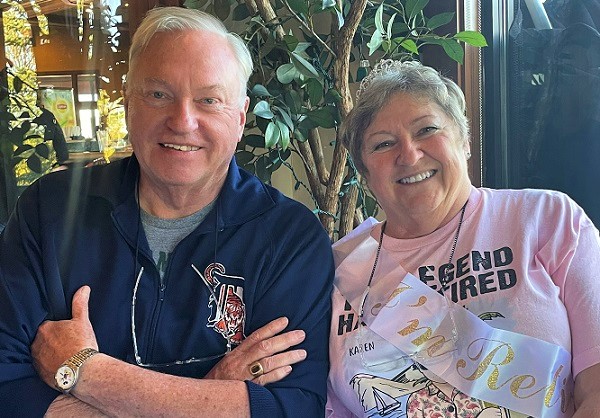 Roberts pointed out that during the 1980s, the MHSAA would conduct nine Executive Committee meetings, each averaging fewer than 10 requests for waivers. By the end of his 32 years, there were 11 Executive Committee meetings annually – with approximately 50 waiver requests presented on average. Still, he and Jackson were able to process the meeting minutes and continue to distribute those decisions within 24 hours.
Roberts pointed out that during the 1980s, the MHSAA would conduct nine Executive Committee meetings, each averaging fewer than 10 requests for waivers. By the end of his 32 years, there were 11 Executive Committee meetings annually – with approximately 50 waiver requests presented on average. Still, he and Jackson were able to process the meeting minutes and continue to distribute those decisions within 24 hours.
“Over the more than three decades that Karen and I worked together at the MHSAA, the work became increasingly more voluminous and complicated – and Karen kept finding ways to increase our efficiency and maximize our output,” Roberts said.
Like Norris when Bush was executive director, Uyl had been part of the MHSAA staff under Roberts since 2004 before eventually moving into the corner office. After those first 15 years together, Uyl knew what a valuable person he had just a few yards away to assist in his transition, and “he just says to do this” and allows his staff to run with it, which Jackson enjoyed.
Her duties have been shifted confidently, mostly to Jamie VanDerMoere, another longtime administrative assistant who is best-known to Michigan school sports people for her leadership with the annual wrestling championship tournaments.
Jackson recently was married to Jim Jackson, and they have plans as they close in on their first anniversary – they’re hoping to travel to Italy at some point and also The Masters in Augusta, Ga., next spring. “I’m not going to miss coming to work every day, but the people,” Karen Jackson said.
And many in school sports across Michigan, although they may not realize it, will miss the contributions Jackson has made to their community over the decades including the context she’s provided as thousands of decisions have been made.
“Not only her understanding of our regulations and the processes of our regulations, but understanding why we have those things in place – when someone does something 45 years, you get a lot of historical context,” Uyl said. “What’s made her so effective is understanding the why – and that to me is something that’s almost impossible to replace.
“When an organization has been around 98 years with only five directors, it says something to have worked for four out of the five. That will never be replicated again.”
PHOTOS (Top) From top left, Karen Jackson has been a mainstay of the MHSAA for decades – serving membership, working with administrators like Randy Allen and Gina Mazzolini or serving as assistant to executive directors like Jack Roberts (right) and Vern Norris. (Middle) Jackson, sitting fourth from left, was the “baby” of the MHSAA staff after joining when she was 18. (Below) Jackson and husband Jim have plans to travel in retirement. (MHSAA archives.)

